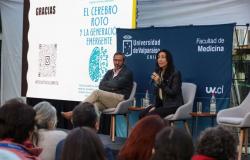A new publication that rescues the Afro -descendant memory in Chile was launched by the PUCV alumni, Alejandra Fuentes. The book, entitled “Art and Afro -descendant Memory in Chile. Álvaro Flaño Amado Legado Ceramic Collection” is available through the Ril Editores website.
The work, financed by the National Fund for Cultural development and the Arts, arises from the interest of the ex -student of the Institute of History to analyze African slavery in Chile beyond the colonial period, addressing its symbolic and material continuity. “It is rather to see its scope in forms, content, representations and specific cultural ways,” he explained, highlighting the value of a small collection of Afrofeneous miniatures preserved by the succession of Álvaro Flaño Amado.
The book examines in detail the collection of legacy Álvaro Flaño Amado, a set of six pieces gathered by the philanthropist in Santiago, representing Afrogen figures in polychrome ceramics. “To this end study, first, the contextual elements to understand this collection, that is, African slavery in Chile and its presence in the female monasteries of the capital,” he said. It also analyzes aspects such as the origin, authorship and iconography of the works, and their relationship with the memories of current Afro -exchanged communities.
One of the greatest challenges of the investigation was to establish this link with contemporary Afro -descendant communities. “Without a doubt, the most challenging thing for me was to link the Flaño collection with the current Afro -Rhilenas communities, and then determine the importance they have in the processes of memory, recognition and self -recognition of the Chilean Afro -descendant tribal people,” he said.
Regarding the impact she expects to generate, the historian said: “I hope they can know a little about the development and importance of African slavery in our country,” adding that it seeks to contribute to the discussion about migrations in Chile and Latin America, as well as demolish myths related to the Afro -descendant population.
Currently, the author coordinates the @Afrovualchile project, an Instagram account that seeks to catastate and disseminate visual representations of Afro -descendant people in Chilean collections. “Registration and research that I intend to publish in a couple more years,” he said.
“My experience in the PUCV was very good, especially in the famous ‘Castillo de Paseo Valle’, where the University History Institute is located,” said the author, who valued her academic and human training. “There I trained as a researcher with teachers and academics of the highest level, in addition to having excellent classmates and great friends,” he complemented.
The historian has an outstanding academic career, with master’s studies and a doctorate in history, and a line of research centered on female monasteries, African slavery in colonial chili and visual representations of the Afro -descendant population.
Among its most recent publications, is the book “Perfumada Ceramics of the Clarisas Nuns” and the article “Study of the female monasteries of Santiago from the perspective of the history of emotions. Chile, XVII-XVIII centuries.”
Red Alumni






